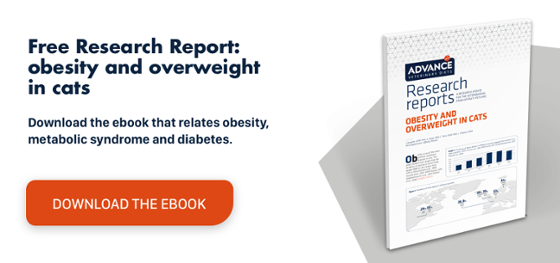Food for castrated cats: how to combat the postoperative tendency to gain weight?
Post-castration weight gain
Several studies have shown that castrated cats, regardless of sex, have a greater incidence of being overweight than intact cats. The risk of developing obesity is 2.8–3.4 times higher for castrated cats compared to intact cats. Weight gain is due to an increase in body fat that courses in parallel with a decrease in muscle mass.
Shortly after castration, patients may manifest an increase in transient insulin resistance in females and lower insulin sensitivity in males. This reduced insulin sensitivity results in less glycaemic control, hence the need to use other cereals such as barley or maize as the main source of starch.1
Castrated cats start to eat more immediately after surgery and lose control of the amount of food they consume. It is therefore essential to limit the amount of food given to castrated cats. What is more, providing food for castrated cats with controlled proportions of the main nutrient groups (proteins, carbohydrates and fats), helps keep weight gain in check.
Weight gain has an impact on the rest of the cat’s body. Castrated cats have a greater risk (between 2 and 4.9 times more than intact cats) of suffering from hyperlipidaemia, diabetes mellitus or fatty liver.
Main causes of weight gain in castrated cats:
Two reasons explain the tendency for castrated cats to become overweight.
1. Increased food intake: Immediately following castration, cats lose the ability to control how much food they eat. This is why it is so important to control how much food is provided, calculating the amount according to each animal’s daily requirements. Food dispensers that promote activity are also a useful tool that control intake while encouraging cats to exercise.
2. Reduced energy needs: Castrated cats require 20 to 30% less energy than intact cats. This reduced energy requirement is due to a decrease in metabolic rate and less physical activity.
- Various studies into metabolic rate have reported contrasting results, but authors generally believe that as the percentage of muscle mass declines, then cats spend less energy maintaining less muscle.
- Physical activity decreases due to behavioural changes. As they lose their sexual instinct and roam the streets less often, castrated cats spend more time at home and therefore expend less energy.
Prevention strategies
- Reduce intake: Control over food for castrated cats is the only measure that has been statistically validated as a successful means of controlling excess weight in these patients. But this intervention does not simply involve reducing the amount of food, as this could lead to both nutritional deficiencies and increase the cat’s appetite. It is very important to change the composition of the diet. Food for castrated cats must contain a greater proportion of protein and fibre to ensure that the cat feels full.
- Increase physical activity: Administering a food for castrated cats is not enough by itself; physical activity needs increasing with the aid of toys, since cats do not gain anything from walks on a lead. Activities such as hunting or climbing up to high places are important for both increasing exercise levels and reducing the animal’s stress. There are also products for overweight pets.

